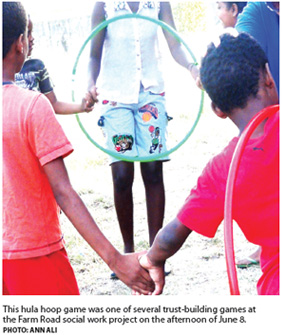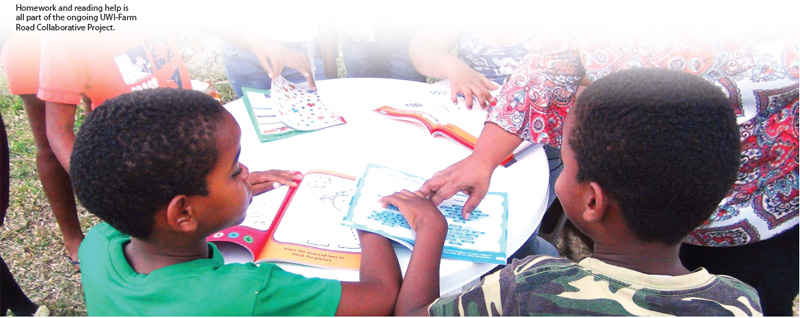
It was a Friday evening at Farm Road, the first Friday after Carnival, movie night. At least that was the plan. But members of the community were yet to show.
Movie night was a way for the UWI team that had spent months gaining the acceptance of the people of Farm Road to reintroduce themselves after the lull of Carnival. Like almost every other part of the Farm Road project, the plan was created with the people themselves.
The St Joseph Police Youth Club had loaned them the equipment. A community member offered electric power. One of the UWI students had designed and printed movie tickets, and the entire UWI team, accompanied by community liaison, went from house to house, inviting the people to come. But they had not come.
For social workers, whose strategy is always partnership with the community, it’s the risk they face. The invitation from the community, once given, can be taken away. “We set up but there was nobody there,” recalls Samantha Mendoza, one of the project coordinators. But suddenly, as the sun went down, residents, young and old, began trickling in, carrying their lawn chairs, blankets and mattresses. Then the cars started pulling up. As the Savannah filled up, members of the community made popcorn and shared it around.
Movie night was a success. It was one of many successes that are making up the slow, momentum-building initiative known as the “UWI-Farm Road Collaborative Project”. Although officially launched in May of 2018, for over a year now the project has been making gains built on innovative social work community intervention methods.
Dr Cheryl-Ann Boodram, Project Lead and Lecturer, Department of Behavioural Sciences, views this as just one example of how citizen-driven initiatives can be organized through partnerships with the university.
On the fenceline
For most people, Farm Road St Joseph is little more than a name from the news reports. It’s a strip of land you see when coming up the bus route, sandwiched between the WASA Head Office and the Valsayn Water Works. Houses painted pale blue or yellow, girded by walls of corrugated sheets, peek out from between the trees. Farm Road is a community built in a forest, surrounded by a concrete jungle.
The road itself winds its way past fields and schools, until it emerges at the Southern Main Rd in Curepe. One of Farm Road’s most prominent neighbours is the Eric Williams Medical Sciences Complex (EWMSC), home to UWI’s Faculty of Medical Sciences.
“Farm Road was chosen because of its unique characteristics and geographical positioning as one of UWI, St Augustine’s immediate fenceline communities” says Dr Boodram. The UWI/ Farm Road Collaborative Project comes out of the Office of the Deputy Principal through the Careers, Co-curricular and Community Engagement Unit. In 2017, a campus-wide committee was established to plan a university-supported community initiative. The goal was to promote the professional and personal development of UWI students, as well as increase the relevance and impact of the university’s work in ways that provided direct benefit to communities. “The Farm Road Collaborative is what UWI is about and what social sciences are about,” says Professor Ann-Marie Bissessar, Dean of the Faculty of Social Sciences (FSS). “We want our work to go beyond theory. What action can we take to make communities better?”
The project is university-led but has been developed, coordinated and implemented by a very small team from within the Social Work Unit – Dr Boodram, Mendoza and (initially) two graduate students, Fidel Sanatan and Avenida Stewart-Nanton. Dr Boodram is quick to point out the enormous support of Lynette Joseph-Brown, Programme and Research Officer in the Office of the Deputy Principal and Kathy-Ann Lewis, Manager of Careers, Co-curricular and Community Engagement.
 The Invitation The Invitation
The project coordinators are careful when they discuss Farm Road. As social workers their focus is on building people and the communities. They are laser-like in intercepting anything that could be seen as disempowering.
Dr Boodram points out, “A big part of the process is using shared values of mutual respect and validation of community knowledge”.
“In our profession we recognise that people are the experts of their communities. They are the architects of their future,” says Dr Boodram. “So the community’s invitation to partner with them is important. We want to support and enhance, but not take over.”
The team went into Farm Road, house by house, meeting people. They asked residents what they wanted for themselves.
“They were very excited and enthusiastic,” recalls Mendoza. “They were really willing to share. One of the things I remember them saying was: ‘You know a lot of people come and go. Will you stay?’ We were always guided by that.”
Based on these meetings they decided that helping the children to complete high school was an achievable goal with great benefit to the community.
Community work
During the 2017 mid-year vacation, the clubhouse of UWI’s Sports and Physical Education Centre (SPEC) was filled with the sound of laughter and play. Twenty-five children from Farm Road took part in a week-long, all-expenses-paid, vacation camp courtesy of the collaborative project.
“We focused on a lot of the issues raised by the community,” Mendoza says, “things like conflict management, etiquette, diligence and empathy.”
To the children and their families, it was much more than an exercise in behavioural improvement.
“They really bought in. Thanks to the support of the Deputy Principal we were able to send a shuttle to pick them up. Every day the children would be well-dressed, well-groomed and waiting with their family.”
With little dedicated funds for the project, the UWI team had to be extremely resourceful in putting the camp together. The project relied on support from individuals, community-based organisations and businesses who were seeking to make a difference in communities. They asked family members for assistance. They reached out to companies like Sunshine Snacks, Vemco, Nestle, Prestige Holdings, Mario’s Pizzeria and UWI staff, friends and family. The support they received was enormous.
“We delivered a quality camp and sports day, and had a field trip to the zoo,” says Mendoza.
Dr Boodram adds, “Everybody was able to give what they could. It wasn’t a huge amount but when you put it all together we were able to have a camp for a week for 25 children that did not lack for anything.”
One week before the camp, the project held a drapery and linen sewing skills training course at the request of the women of Farm Road under the auspices of the School of Education.
Consistency
The centrepiece of the collaboration is the White Tent Project. Every Friday, from 4 pm to 6 pm, the social work team sets up a white tent at the edge of the savannah in Farm Road. They help the children with homework, play games with them and administer short 15- to 30-minute life skills sessions.
“One of the keys to our success is consistency,” says Dr Boodram. “We have to be there all the time. So we have basically dedicated our Friday evenings to the project. The community does not have a central area or community centre. So we put up the tent and invite the children to come.”
There’s a resolute power in both Dr Boodram and Mendoza, matched by their genuine concern for people. Both see social work as their life’s calling.
“Social work chose me,” Mendoza laughs. “I grew up in deep South, Palo Seco. We were a small village but there was always a sense of community. We learned that if the neighbour doesn’t have something, you share.”
It’s the kind of commitment necessary to venture deep into a community like Farm Road that faces many challenges.
Dr Boodram says: “Every Friday people in the community come and help us put up the tent. And at six o’clock when they see us wrapping up, they come and take down the tent.”
The members of the UWI project team say that the people of Farm Road are good people, who like everyone else have legitimate goals and ambitions, love their family and want their community to prosper.
“When we went into Farm Road we met people who genuinely wanted to do well. We saw people who got up every morning and worked. We met people who coped. We saw parents genuinely interested in children’s school performance but not being able to guide the child through homework,” Dr Boodram said.
Now that the project has been established, they are looking ahead towards its expansion. The team has identified three areas of focus – health equity, education and life skills. The team wants to support voluntarism and in-service learning from other Faculties such as Food and Agriculture, Medicine and Education.
The objective, they say, is for “young people to have better life chances so the community becomes more resilient.”

|





